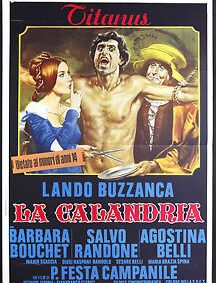Sex Italian-style, transported into the Middle Ages with a Boccaccesque flavour
A wonderful cast overflowing with beauty
Adapted from the 16th century comedy by Cardinal Bernardo Dovizi da Bibbiena, and with abundant references to Boccaccio, the film manages to distinguish itself from the often hastily cobbled together decamerotico genre thanks to its narrative development and formal qualities, its comedy, which is more suggestive than risqué, and its careful historical reconstruction. Pasquale Festa Campanile reveals himself to be one of the sharper observers of sexuality in Italian cinema of those years. The role of the “wife-stealer” is perfectly suited to Lando Buzzanca, who here puts aside his habitual Sicilian character to experiment both with a Tuscan one, and when dressed up as a woman, a Venetian one. Barbara Bouchet and Agostina Belli are sights to behold.
In an unspecified Middle Ages, Lidio “the wife-stealer” introduces himself into the household of Calandrio disguised as a women so that he can seduce Fulvia, the lady of the house. However, he ends up becoming the object of affection for both of them, in a sad game of destiny that will cost him his manhood.
Sex Italian-style, transported into the Middle Ages with a Boccaccesque flavour
A wonderful cast overflowing with beauty
Adapted from the 16th century comedy by Cardinal Bernardo Dovizi da Bibbiena, and with abundant references to Boccaccio, the film manages to distinguish itself from the often hastily cobbled together decamerotico genre thanks to its narrative development and formal qualities, its comedy, which is more suggestive than risqué, and its careful historical reconstruction. Pasquale Festa Campanile reveals himself to be one of the sharper observers of sexuality in Italian cinema of those years. The role of the “wife-stealer” is perfectly suited to Lando Buzzanca, who here puts aside his habitual Sicilian character to experiment both with a Tuscan one, and when dressed up as a woman, a Venetian one. Barbara Bouchet and Agostina Belli are sights to behold.
In an unspecified Middle Ages, Lidio “the wife-stealer” introduces himself into the household of Calandrio disguised as a women so that he can seduce Fulvia, the lady of the house. However, he ends up becoming the object of affection for both of them, in a sad game of destiny that will cost him his manhood.
